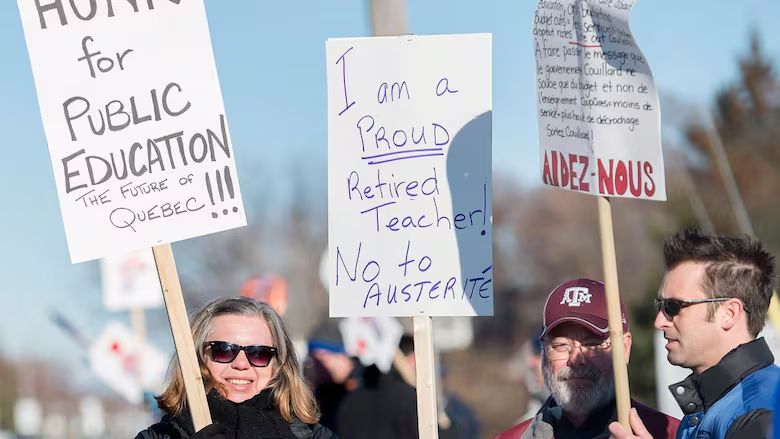Quebec public sector deal includes salary increases, hike in retirement age
Thousands still without a deal as negotiations drag on between government and unions

Could the end be in sight to the Quebec public sector strikes that have led to school closures and province-wide walkouts?
The agreement-in-principle struck between the Quebec government and the common front of public sector unions includes salary increases and a one-year increase in retirement age, according to Radio-Canada sources.
The tentative deal was struck following a 13-hour negotiation blitz on Thursday between Treasury Board President Martin Coiteux and union leaders of the Common Front.
- Quebec and public workers unions reach agreement-in-principle
- Tens of thousands take to Montreal streets in latest public sector strike
Premier Philippe Couillard told CBC Montreal's Daybreak that both parties had to compromise to reach an agreement.
"At the end of the day, it's a good good deal for the taxpayers — for the patients in the hospitals, for the kids in the schools and their parents — and also for our public sector employees," he said Friday.
The Common Front, a coalition of Quebec public sector unions including some of those representing teachers and health care workers, represents 400,000 of 550,000 state employees.
If the deal is accepted by union members then the tentative strike days for the majority of English-language teachers could be lifted.
Salary increases and a change to retirement age
The salary increases could amount to as much as an eight or nine per cent over a five-year period, according to Radio-Canada.
The tentative deal includes:
- 2015: A flat rate of approximately $500
- 2016: 1.5 per cent
- 2017: 1.75 per cent
- 2018: 2 per cent
- 2019: A flat rate of approximately $250
In 2019, most public sector workers would see an additional increase as high as 2.4 per cent based on adjustments to salary-scale inequities.
The tentative deal would also raise retirement age from 60 to 61. Quebec initially proposed to push the retirement age to 62.
The two sides started off "light years" apart, with unions demanding a 13.5 per cent pay increase over three years. The government proposed a three per cent increase over five years.
Thousands still without a deal
Other unions, meanwhile, are still in the midst of negotiations.
The Fédération autonome de l'enseignement (FAE), which represents 34,000 French-language teachers, is still without an agreement. Talks resumed between Quebec and the group earlier this week but there is no deal yet — which means that there could be strike days and cancelled school days in the future.
The Syndicat regroupant l'ensemble des professionnels du gouvernement du Québec (SPGQ), which represents white collar workers, has also not reached a deal with the government.
Earlier this month, the Fédération interprofessionnelle de la santé du Québec (FIQ), which represents the majority of Quebec nurses, reached a deal concerning work conditions but not salary.